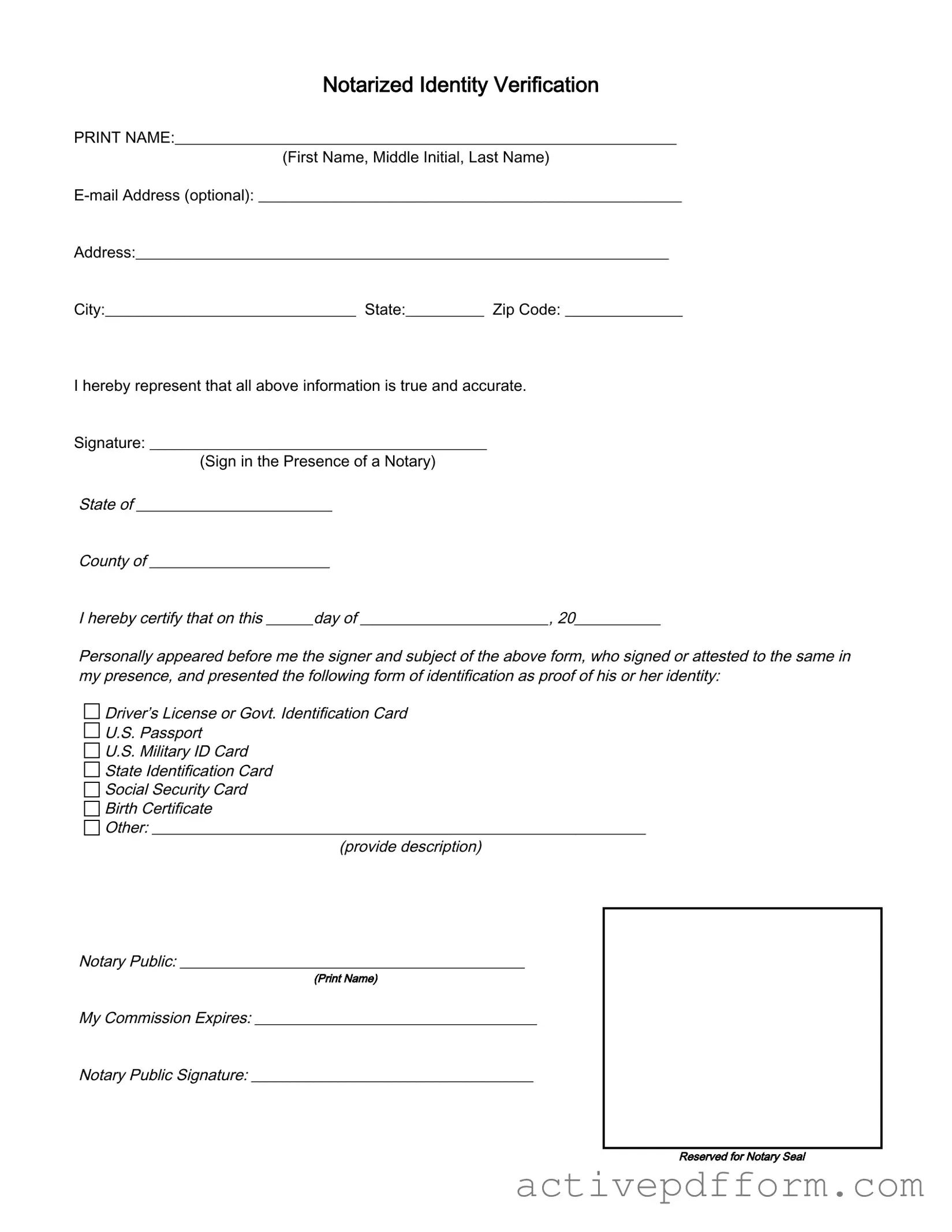Free Notarized Identity Verification Template
The Notarized Identity Verification form serves a crucial role in confirming an individual's identity through a reliable and legally recognized process. This form requires the signer to provide essential personal information, including their full name, optional email address, and residential address. Accuracy is paramount, as the signer must affirm that all provided details are truthful. A signature is required, but it must be executed in the presence of a notary public, ensuring an added layer of authenticity. The notary's role is to witness the signing and to verify the identity of the individual through various forms of identification, such as a driver’s license, passport, or military ID. The notary then certifies the transaction by documenting the date, location, and their own credentials, including the expiration of their commission. This form not only facilitates secure identification but also helps protect against identity theft and fraud, making it an essential tool in various legal and financial transactions.
Document Specifics
| Fact Name | Details |
|---|---|
| Purpose | The Notarized Identity Verification form is used to confirm an individual's identity through a notarization process. It ensures that the information provided is accurate and verified by a notary public. |
| Required Information | Individuals must provide their full name, optional email address, residential address, and signature. This information is essential for the notary to validate the identity of the signer. |
| Identification Types | Acceptable forms of identification include a Driver’s License, U.S. Passport, Military ID, State ID, Social Security Card, Birth Certificate, or other specified identification. |
| State-Specific Laws | The notarization process and requirements may vary by state. For instance, California's notarization is governed by the California Government Code, while Texas follows the Texas Civil Practice and Remedies Code. |
| Notary's Role | A notary public plays a crucial role by witnessing the signature and verifying the identity of the signer. The notary must complete the form by providing their name, signature, and commission expiration date. |
Similar forms
The Notarized Identity Verification form shares similarities with several other documents. Each serves a unique purpose in verifying identity, but they all emphasize accuracy and authenticity. Here are six documents that are similar:
- Driver’s License: This government-issued identification confirms a person’s identity and age. Like the Notarized Identity Verification form, it requires accurate personal information and is often used in various transactions.
- Passport: A U.S. passport serves as proof of identity and citizenship. It includes personal details and a photo, similar to how the Notarized Identity Verification form collects personal information for verification.
- Military ID: This identification card verifies the identity of military personnel. It, too, requires accurate information and is recognized widely, much like the Notarized Identity Verification form.
Arizona Notice to Quit: This form is essential for landlords, officially requesting tenants to vacate a rental property while providing a specified timeframe. To understand the requirements and process, you can refer to the Arizona PDF Forms.
- State Identification Card: Similar to a driver’s license, this card provides a way for individuals without a driver’s license to verify their identity. Both documents require notarization for certain legal processes.
- Social Security Card: This card contains a unique number assigned to individuals for tracking earnings and benefits. While it does not include a photo, it is essential for identity verification, akin to the notarized form.
- Birth Certificate: This document confirms a person’s birth and identity. It is often required for various legal purposes, similar to how the Notarized Identity Verification form is utilized in formal settings.
Notarized Identity Verification Example

Notarized Identity Verification
PRINT NAME:________________________________________________________________
(First Name, Middle Initial, Last Name)
Address:____________________________________________________________________
City:________________________________ State:__________ Zip Code: _______________
I hereby represent that all above information is true and accurate.
Signature: ___________________________________________
(Sign in the Presence of a Notary)
State of _________________________
County of _______________________
I hereby certify that on this ______day of ________________________, 20___________
Personally appeared before me the signer and subject of the above form, who signed or attested to the same in my presence, and presented the following form of identification as proof of his or her identity:

 Driver’s License or Govt. Identification Card
Driver’s License or Govt. Identification Card

 U.S. Passport
U.S. Passport

 U.S. Military ID Card
U.S. Military ID Card

 State Identification Card
State Identification Card

 Social Security Card
Social Security Card

 Birth Certificate
Birth Certificate

 Other: _______________________________________________________________
Other: _______________________________________________________________
(provide description)
Notary Public: ____________________________________________
(Print Name)
My Commission Expires: ____________________________________
Notary Public Signature: ____________________________________
Reserved for Notary Seal
Understanding Notarized Identity Verification
What is the purpose of the Notarized Identity Verification form?
The Notarized Identity Verification form is used to confirm an individual's identity. This form is often required for various legal and financial transactions where verification of identity is crucial. By completing this form, a person attests that the information provided is accurate and true, ensuring that their identity can be authenticated by a notary public.
Who needs to complete the Notarized Identity Verification form?
Anyone who is required to verify their identity for legal or official purposes may need to complete this form. This could include individuals applying for loans, opening bank accounts, or engaging in other transactions that necessitate identity verification. It is essential for individuals to check the specific requirements of the institution or agency requesting this form.
What information is required on the form?
The form requires the individual's full name, email address (optional), and residential address, including city, state, and zip code. The individual must also sign the form in the presence of a notary public. Additionally, the form requires details about the form of identification presented to the notary, such as a driver's license, passport, or other acceptable identification.
What forms of identification are acceptable?
Acceptable forms of identification include a driver's license, government identification card, U.S. passport, U.S. military ID card, state identification card, social security card, and birth certificate. If an individual presents a different form of identification, they should provide a description of it on the form.
How does the notarization process work?
The notarization process involves the individual signing the form in front of a notary public. The notary will verify the identity of the signer by examining their identification and then completing the notarization section of the form. This includes certifying that the signer appeared before them and signed the document in their presence.
Is there a fee for notarization?
Yes, notaries may charge a fee for their services, which can vary by state and notary. It is advisable to inquire about any potential fees before scheduling an appointment with a notary public. Some organizations may provide notarization services for free to their clients.
How long is the Notarized Identity Verification form valid?
The validity of the Notarized Identity Verification form typically depends on the requirements of the entity requesting it. Some organizations may accept it indefinitely, while others may require it to be recent. It is essential to check with the requesting party to determine their specific validity period.
What should I do if I make a mistake on the form?
If a mistake is made on the Notarized Identity Verification form, it is best to complete a new form rather than attempting to correct the error. Once notarized, the document is a legal record, and any changes could lead to complications. Ensure that all information is accurate before signing in the presence of a notary public.
Dos and Don'ts
When filling out the Notarized Identity Verification form, it is important to follow certain guidelines to ensure accuracy and compliance. Here are seven things you should and shouldn't do:
- Do print your name clearly and legibly in the designated area.
- Don't leave any required fields blank; ensure all information is filled out completely.
- Do provide accurate information regarding your address and contact details.
- Don't use nicknames or abbreviations; use your full legal name as it appears on your identification.
- Do sign the form in the presence of the notary public.
- Don't sign the form before meeting with the notary; your signature must be witnessed.
- Do present an acceptable form of identification when requested by the notary.
Following these steps will help ensure that your form is completed correctly and efficiently. Take your time and double-check your entries to avoid any mistakes.
Check out Common Templates
Yes/no/maybe List - Openness to exploring anal sex in a safe and consensual environment.
Edison Bill Template - Consumer rights regarding billing accuracy are outlined for reassurance.
The California Articles of Incorporation form is a legal document used to establish a corporation in California. This form outlines essential details about your business, such as its name, purpose, and structure. Completing this form is the first step toward officially launching your corporation, so be sure to fill it out accurately by clicking the button below, or you can access more information through California PDF Forms.
Geico Supplement Request Form - Each supplement request requires its own form, per GEICO's policy.
